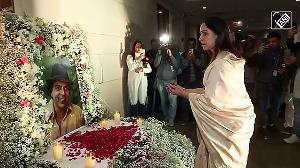The former chief minister of Andhra-Pradesh, Chandrababu Naidu, said in his keynote address on 'Management beyond the Obvious' at IIMA-Confluence 2005 on Friday: "India is not a poor country, we are making it a poor country."
Naidu quoted Leo Tolstoy's statement on youth education and ended his speech with George Bernard Shaw's appeal to youth to see beyond.
In between, he spoke on issues related to economic reforms, his achievements as chief minister, the importance of information technology, education, telecom revolution, spiritual essentiality and expectations of people from young managers.
He said he was experiencing a 'feel-good' factor from being among managers as a politician, Naidu said, "We are basically politicians and mainly seen among the political circuits, but it gives me happiness to interact with the managers of today and tomorrow." Naidu said economic reforms in India were falling behind.
"Today China is competition, Singapore is the developed nation and delayed economic reforms have lead analysts to speculate future of our country as one of the emerging economies in coming decades," he said.
India became independent in 1947 but independence did not mean economic independence.Economic reforms happened only after 1981 after 34 years of a mixed, socialist economy which left people below the poverty line, committing suicides dying of starvation. Even today, people in some areas lived in such conditions, he added. Naidu said the government ran out of foreign exchange to buy crude oil in 1990 and India's gold reserves had to be mortgaged. Economic reforms were blocked by political parties and politicians, alleged Naidu.
"Politicians feared formulating economic reforms as they felt reforms were meant for the rich and they would lose their vote banks," he added.
As a result, economic reforms were not formulated in time.
Economic reforms was an era in which a single party dominated the nation, and growth was limited. Economic reforms were brought in by multi-party governments which realised the importance of economic reforms.
Reforms could support the nation's agriculture, services, manufacturing, information technology and tourism sectors and propel India into a powerful economy, he added.
Talking on the challenges facing India in the 21st century, Naidu referred to shift in Andhra Pradesh in core sectors like health, education, infrastructure and agriculture using IT platforms and e-governance solutions. Naidu accorded top priority to training, education and need for trained manpower in the era of convergence using IT as the platform and telecom as the medium for connectivity. Naidu emphasised the need for re-engineering administrative reforms. Naidu said the system of administrative services was old and according to the British format and as a result more and more students are shifting from bureaucracy to the private sector.
The government should consider changes in the administrative services to make members realize they are social managers too.
Bureaucracy needs to change, he added. "India is not a poor country, but if we do not implement economic and administrative reforms, we are surely making India a poor country," he said. India would be a super-power in future and was a sleeping giant as far as its economic growth is concerned.
The brain-drain of the past would in future become a brain-gain as Indians would return with knowledge and create wealth in India. Distribution of wealth' and preserving values were the other challenges facing India, Naidu told managers.
"With wealth comes all other vices and weaknesses and that's where the demarcation between a poor and rich starts - it should be the moral responsibility of future managers to create a spiritual society trying to help masses in preserving values", he said. Balancing wealth distribution was one of the major challenges I foresee for the future managers," he added.
In response to a question in the open-house session on 'Good governance' Naidu referred to Nitish Kumar, the new chief minister of Bihar, and quipped, "Till now nobody spoke on good governance, but yesterday on television I even saw Nitish in Bihar talking about good governance!"





